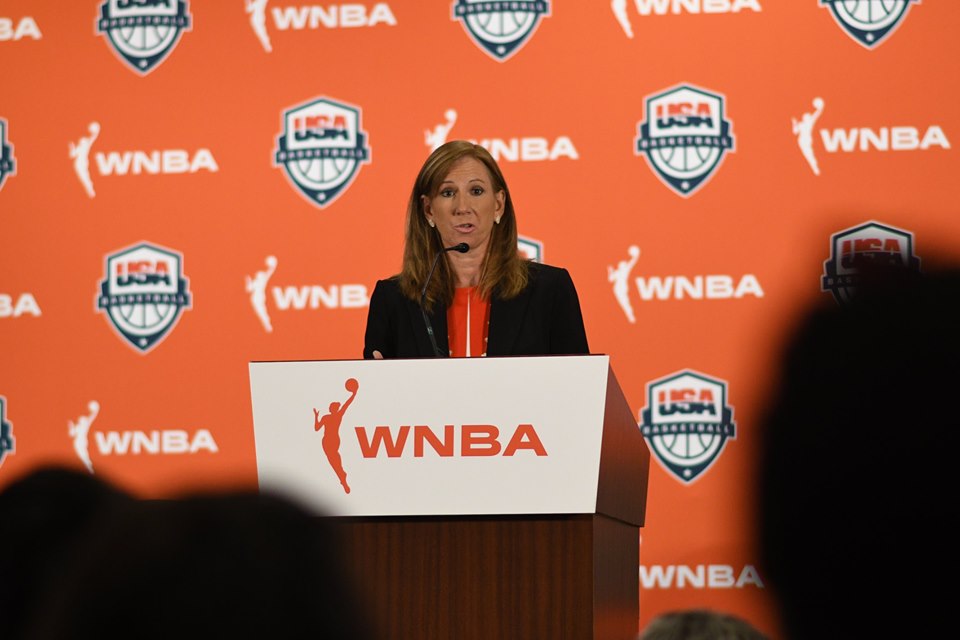With us being so swept up in March Madness, it can be easy for other relevant news to be swept under the rug.
But there are certain stories one cannot help but ponder.
Two weeks ago, WNBA commissioner Cathy Engelbert gave an interview to People Magazine. The gist of the interview was what the W is currently doing to assist Brittney Griner, currently detained in a Russian jail after attempting to leave the country via airport.
Engelbert made comments during that interview that one could not help but scratch one’s head at. She was talking about WNBA players and how they play overseas once the season comes to a close.
She claimed, according to the People piece, that the WNBA is taking steps to improve pay equity, but that many players still want to head overseas. She claimed that a few players decide to hoop in other countries because of how much they love the sport.
They want to play as much as they can while their bodies can still do that, so we’ll support it, but we’re working on models that will keep more of our players in the U.S. for longer periods of time in the offseason.
–Cathy Engelbert, WNBA commissioner (People Magazine)
While this may be true in the case of a few players, the bottom line is that overseas teams such as Russia’s UMMC Ekaterinburg and Dynamo Kursk pay salaries that dwarf those that come from the New York Liberty’s and Los Angeles Sparks’ of the world.
Continuous year-round play is something that takes a real toll on the body. Yes, WNBA players are some of the most athletic physical figures on this planet. But they are still human beings at the end of the day. And as Liz Cambage and countless other WNBA greats have shown us, how much physical shape one is in has zilch to do with how mentally healthy WNBA players may be.
And as the Griner saga illustrates, it could potentially put players in dangerous situations if wars break out in those foreign countries. Something similar happened when Alexis Peterson was playing in Israel when unrest flared up in the Middle East between Israel and Palestine.
Engelbert has done a few great things for the league in her short tenure as commissioner. Pulling off the 2020 bubble in Florida in the midst of a pandemic with little to not COVID-19 outbreaks was an Amazonian (the woman warrior, not the Northwestern-based corporation that has naming rights to the Seattle Storm’s home arena) effort. Landing sponsorships and securing $75 million in capital gains have also been feathers in Engelbert’s cap. But her take on why WNBA players decide to head overseas is all cap.
One wonders what Engelbert was thinking when she made those remarks, but she may have unintentionally doused more kerosene onto the CBA flames – something that surely will continue to flare up over the coming years.
The Griner detainment, the Howard Megdal bombshell in Sports Illustrated about how the Liberty were fined $500,000 for chartering planes (something most WNBA players are in favor of) and Breanna Stewart’s criticism of the current CBA’s prioritization clause (where W players have to prioritize their clubs over the higher-paying overseas ones in exchange for the higher salaries) are all laying the foundation for another potentially heated CBA fight in those coming years.
Griner would not be in the unfortunate fix she is in if she was compensated fairly by the Phoenix Mercury. Clara Wu Tsai, co-governor of the Liberty, should have been bestowed the WNBA’s Advocacy Award over Chris Paul for actually attempting to do something about the WNBA’s much-ballyhooed travel woes. Oliver Weisberg, the Liberty’s alternative governor, should have his place restored on the WNBA’s executive committee. And Engelbert needs to realize who she is dealing with here.
She needs to realize that these are the same WNBA players who singlehandedly took matters into their own hands and got Kelly Loeffler, the ex co-governor of the Atlanta Dream, ousted from the W after she made anti-Black Lives Matter comments during her short time as a senator from Georgia. WNBA players are of the “F Around and Find Out” sort. Also, the W is an 80% Black league and Engelbert, a white woman, may not get the same benefit of the doubt that Laurel Richie or Lisa Borders would have received because they are both Black women.
While it is admirable that Engelbert says that she is working on a solution that will allow players to stay in the United States year-round, insinuating that those same players are doing so for anything other than financial purposes is tone-deaf and implies she is spending a bit too much time on Park and Madison Avenues.
In addition, in coming seasons, if top college athletes such as Aliyah Boston, Paige Bueckers, Caitlin Clark and Haley Jones earn more money off NIL deals than they would in one season of WNBA play, that would also make the W look cheap at a time where investment in women’s sports is going in one direction – up.
Engelbert claims that some players decide to go overseas for reasons related to “passion.” That may be true in high school, but it quickly becomes a business the nanosecond players hear their names called at the draft. Thanks to NIL, it is now a business for athletes at the college level as well.
One of the main things us as WNBA fans are passionate about Engelbert is ensuring that the 144 players that comprise the W are fairly compensated. After all, these are the 144 most elite women’s hoopers in the world and they should be treated as such. The CBA, which does up the top salaries to the $500-650,000 plateau, as mentioned in the People piece, was a major step forward.
It was a major step, but it was only a step – and one will be sure that when it is time to renew said CBA that the WNBPA will want to take more steps in that right direction to ensure true pay equity for WNBA players.
Part of the reason WNBA players have to go overseas also lies in the fact that some owners want to be cheap and not treat the W as a passion. Instead of worrying about the passion of players, Engelbert would be wise to take a look at these owners and see which ones are truly passionate about seeing the WNBA thrive and expand and which ones only treat it like a sidepiece. It is clear which side the Tsais and Las Vegas Aces owner Mark Davis are on – but what about the Mercury’s Robert Sarver or the Dallas Wings’ Bill Cameron?
Engelbert knows this herself – or the league and the union would not have ironed out the prioritization clause in the first place. And while what she said may be at best half-true, there is no question that higher salaries are what drive the overseas push, one that will be really murky given the Griner saga.
Once we achieve real pay equity for WNBA players, perhaps the “passion” talk will hold a lot more weight. Until then, pressure must be applied on Park Avenue to ensure the passion WNBA fans have for ensuring that the days of overseas competition truly being a need instead of a want will soon be reaching its end.




